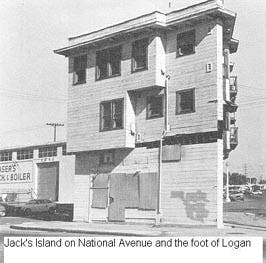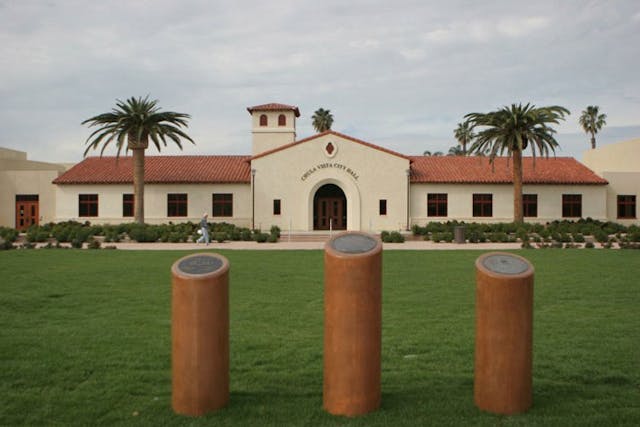Logan Shorts-Jack’s Island

A Bit of History:
By Augie Bareno
Don Jose Puentes, owner of the New Mexico Café and his buddy Horobado, from Azteca’s pool hall, walked into Jack’s Island Bar, a funny looking building at the corner of 26
th and National Avenue, at the foot of Logan Street. They are looking for Manuelito Jones, who is the only Mexican born, San Diego Policeman and his partner Vito Bonafortuna.
Manuelito Jones and Vito Bonafortuna patrol the area from Shelltown, to the waterfront, and all the way to “Waptown.” They are given a great deal of latitude, in how they dispense justice, since a trip downtown, to Police Headquarters, is reserved for the major crimes. On top of that, they don’t always get to use a squad car, since the few that they have, are generally used to service the areas around Horton Plaza, north to Balboa Park and over to Adams.
They have to rely on friends, relatives or the street car, to make their rounds, sometimes, if it’s urgent they can get a lift from old man Aloysius Farley, who operates a scrap and towing business, at the foot of Crosby and Main. Mr. Farley, is a small man, but very tough, having come to San Diego, in 1911, some say, he had some problem, with the “Black Hand,” in his native Brooklyn, New York. His workers, the Aviles brothers, Slim and Nando called him “Chapo Farley,” behind his back, but they know enough to make sure he never hears them.
Old Man Farley knows that its good business to be friendly with the SDPD, especially since its Manuelito and Vito, who can authorize the impounding of cars and whatnot.
Jack’s Island Bar was opened in 1905 by Joseph “Jackie” McCoy, a roughneck who came to San Diego from Boston to work on the railroad, which was being developed to support the military bases being built along the San Diego waterfront. Jackie McCoy, for the first ten years or so, ran the bar to serve the railroad workers, mainly Irish and Germans, but as the railroad work started to slow down, the Irish and German workers started to move away. This caused a change in the neighborhood and clientele.
Little by little, Italian fisherman and the Mexicans working on the construction projects along Harbor Drive, started to hangout at the bar. Jackie McCoy liked the feeling of his new customers, eventually all his customers were either Italians or Mexicans, but that was ok, since they looked out for each other; it was a sense of family that reminded him of the Irish. It was a tough love, they had for each other. Jackie McCoy learned the importance of the words Compere to the Italians and Compadre to the Mexicans.
For Manuelito and Vito, Jack’ s Island, was the perfect place, to do police business, they could dispense justice, keep an eye on the bad guys, get information and visit with family all at the same time. Both men, came from very large families, Manuelito Jones came to San Diego, in 1900 in the first wave of Mexican families coming from Baja California, first to Calexico, then Lemon Grove, then finally to Logan Heights. He still has many relatives and friends living in Tijuana and Mexicali, some of who had a degree of prominence in business and politics.
Vito Bonafortuna was born in Brooklyn, New York, he came to San Diego after service in World War I and he came to work for his uncle Tony Rocaforte who operated a small restaurant on the waterfront called “Pepinos.” Pepinos Restaurant was a favorite of many prominent San Diegans because of its fish soup and fresh catch of the day. Uncle Tony Rocaforte, also had other attributes that made him, extremely popular, on the waterfront; he was what you call a “Favors Man.” It meant, if you had a problem with the police or your job or whatever, Uncle Tony could help you solve your problem and you would owe him a favor in return. Everything was conditioned on not asking how things got done and pledging your friendship to Uncle Tony.
Uncle Tony, being a smart man knew he wanted more for his nephew than what most Italians of the day could expect in the way of opportunities. He was especially proud of Vito, for having distinguished himself in battle. It didn’t take Uncle Tony long to figure out what he wanted for his nephew; he was going to get him on the police department, by calling in one of his major favors. Having an Italian on the police force was unheard of for San Diego, let alone one with such family connections, but he knew the favor he had taken care of involved some of San Diego’s best families and it was time to collect.
The graduation SDPD Police Training Course No 7B, 1925 had a total of 19 students, 17 whites, one Italian and one Mexican born. Manuelito Jones and Vito Bonafortuna lives would never be the same.
Chief Buck Riley, who came to San Diego in 1897 after working as Pinkerton Detective in Wichita, Kansas, knew what kind of men made the best policeman. In 1917 he was appointed San Diego Police Chief because his uncle “Big Bob Kensington,” was a major landowner with many friends “Downtown “and the owner of the Bank of the West, which counted as its primary clients, the Treasury of the City and County of San Diego.
Chief Riley, like his father, grandfather and uncles grew up in the tradition of the “Lodge of the Western Sun,” he knew what it had done for him and he believed every decent and responsible man came from that tradition, no more no less. Faced with the dilemma of Manuelito Jones and Vito Bonafortuna, Chief Riley knew he had to come up with a way to keep his good officers, the men of the tradition, away from the two “foreigner officers Mannuell and Veeto.”
Since the damn Volstead Act of 1920, the Police Department, Navy and US Customs had to keep a sharper eye on the Waterfront and Mexican border at San Ysidro, to try and catch the Wilson Bros, who were running a major amount of hooch to Los Angeles and points north. Wilsons were a big Mexican family out of Ensenada, whose ancestor James Wilcox Wilson, was the first Englishman, to settle in Baja California. They had since, very wisely, gotten into the bakery and candy business and set up shops throughout, Tijuana, San Diego, Riverside and San Bernadino. They also imported Italian olive oil and wines into Mexico. This provided them with an existing network of stores, warehouses and permits for importing and exporting goods and large fleet of trucks. They only used family members in their businesses and most importantly, they maintained a network of friends in high and low places, on both sides of the border that could be called on for favors.
Their partner in olive oil and wine importing businesses, out of San Franciso, was Black Jack Lanzo, who operated warehouses on the waterfronts of San Francisco, San Pedro, Long Beach and San Diego and Pesqueria Napolitana, SA, in Ensenada. Black Jack Lanzo was reported to be a man of respect, with cousins and uncles and friends working the docks, throughout California. One of his uncles in San Diego was none other than Uncle Tony Rocaforte, proprietor of “Pepinos”and “Favors Man”, extraordinaire.
He had a few years back connected his nephew Black Jack, with his friend in Tijuana, Eulalio “Huero” Wilson, the patriarch of the Wilson family. Huero Wilson and Uncle Tony Rocaforte had become friends when a cousin of Tony, visiting from New York, got out of control at a sporting house operated by the Wilson’s, in the Colonia Libertad, TJ and seriously injured one of the working girls. The cousin Giuseppe Mangano was arrested and was being held, awaiting the circuit procurador (prosecutor), to come to Tijuana. Word reached Uncle Tony, through the Aviles brothers, who he had helped before, with some bail problems, about his cousin; this concerned him greatly as his cousin’s Father, Don Carlo Mangano, was a major man of the tradition in New York and anything happening to his son, would have to be avenged, either through Uncle Tony or all over him.
Nando Aviles offered Uncle Tony that the only way to solve such a complicated problem, would be to reach out directly to Huero Wilson, to see if an accommodation could be made. Since the Aviles brothers worked for Farley’s Towing but lived in Tijuana, they volunteered to make the connection for Uncle Tony with Huero Wilson. A payment of $2000.00 was given to Huero Wilson, to release Cousin Giuseppe. However, unbeknownst to Uncle Tony, he was charged $2500.00 by the Aviles brother, saying that was the price, Huero Wilson wanted. The Aviles brothers had cheated two very dangerous men, a price that would later prove to be fatal. Huero Wilson and Uncle Tony had formed a bond that would be responsible for much darkness.
Chief Riley figured that if some misfortune could befall Jones and Bonafortuna in the course of their duties, he could be rid of them and whether it happened trying to catch the Wilsons or some other scum, it would happen sooner by putting them to patrol beat 6-North to Market, west to Waptown, east to Shelltown, South to the Border.
Covering that beat, without much support would prove his point, that only men of the Western Sun tradition should be San Diego policemen. To make sure they would fail, Chief Riley put the word out to his friends, in the Patriotic Sons of West, a white Christian Hunt and Fish Club, which was a front for the United Sons of the Eternal South, that any member who kicks either Jones or Bonafortunas ass, they would not be prosecuted and would receive $20.00 from the Police Benevolent Association.
He figured by putting a bounty on Vito and Manuelito, they would likely get beaten, then he could fire them for cowardice in the line of duty. Little did Chief Riley realize that both Maneulito and Vito love to fight, Manuelito grew up on Newton Street next door to Prince Albert Martinez who was California State Middleweight Champion and loved sparring with Manuelito because of his speed and power. Vito had learned to fight to survive; he enjoyed the bare-knuckle brawls of Hell’s Kitchen and of course his courage in battlefield, made him one tough Bambino. Many a member of the Patriotic Sons of the West, payed dearly for Chief Riley’s miscalculation.
The New Mexico Café and the Azteca Pool Hall, located at the north and south corners of 27th and National avenue were operated by two of the most colorful characters in all of Logan Heights and possibly, all of San Diego. Don Jose Puentes and Juventino “Horobado” Penalemus, both natives of Jerez, Zacatecas, old men who loved telling stories of their times in the revolution, drinking tequila and womanizing. They both had despite all their efforts to the contrary, turned into successful businessmen. The Azteca Pool Hall was the meeting place for all the workers in the area.
Since, Don Jose and Horobado had come to Logan Heights together in 1907, from Las Cruces, New Mexico and they were compadres, they always tried to work little deals to help out each other.
Horobado and Don Jose had particular fondness for “Manito’s,” transplanted New Mexicans who had come to California; they especially liked anybody from Las Cruces and Grants, New Mexico. They were very proud, that one of their compadres from Grants, New Mexico, Don Felipe Usquivarno had sent them a letter asking them to look out for his son Anthony and his friend Freddy Lopez, who were working on the Railroad Construction in San Diego and also involved with the Alianza Trabajadora and some gavacho chingadera called “The Progressive Worker League.”
Captain Wellington Burnside, SDPD, hated dealing with all the complaints about Worker’s rights rabble rousing in the most important construction projects in San Diego’s history, the Naval District at the foot of Harbor Drive. He was especially sick of hearing that some of the Mexican laborers were complaining about not getting the same wage as the white workers. This really incensed him as he felt they should be happy to have a job, any job, especially at the height of the depression. Every investigation about the problem always turned up the same two names as the principal troublemakers: Tony Usquivarno and Freddy Lopez, both good workers, fairly good with their fists, and members of some Mexican group called “Alianza Trabajadora.”
The pressure from downtown to take care of the “Mexican Problem,” was intense on both Captain Burnside and Chief Buck Riley, they needed to do something right away. They damn sure couldn’t trust Manuelito Jones and Vito Bonafortuna to take care of this, it had to be done in such a way so that these bastards wouldn’t become heroes and stir up the rest of the good Mexican workers.
Marcos Aviles had attended San Diego High School, graduated in 1927, and still maintained school friendships. One of his friend was Billy Adams, whose parents owned Adams Real Estate. Billy had, through Marcos Aviles, developed a major marijuana habit, almost to the point where he could no longer function and had in fact unsuccessfully tried suicide, when he was high on especially strong “Loco Weed.” During his treatment, he confessed to his parents and blamed it on Marcos Aviles; this incensed his parents, the Adams, and they were going to make Marcos Aviles pay for what he had done to their son.
Adams Real Estate traditionally paid for the annual Police Benevolent Association Fourth of July Family picnic, the program always ended with Chief Riley and Captain Burn-side, thanking the Adams family for their generosity and pledging their appreciation and support to them. Little did Chief Buck Riley and Captain Burnside, know that their expression of support for the Adams would be severely tested and yield such devastating results.
END OF PART 1



 Arturo Castañares
Arturo Castañares



